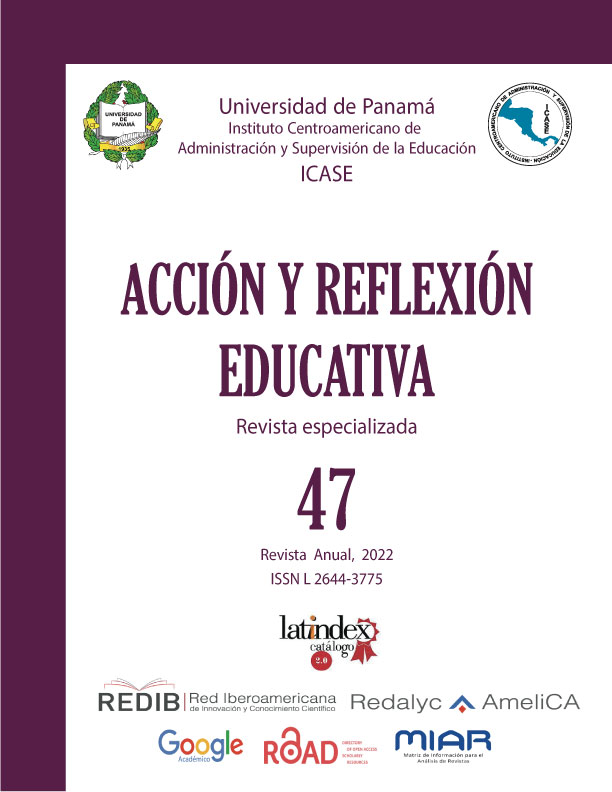References
Autoridad Nacional para la Innovación Gubernamental (AIG). (29 de agosto de 2017). Normas Generales para la Gestión de las Tecnologías de la Información y Comunicación en el Estado. Gobierno de Panamá. Autoridad Nacional para la Innovación Gubernamental. Dirección Nacional de Gobernanza de TI. https://aig.gob.pa/descargas/2019/06/normas-generales-para-la-gestion-de-las-tic-en-el-estado-version-1.pdf?csrt=2609585498224861
Archer, N., y De Gracia, G. (2020). Educación Superior y COVID- 19 en la República de Panamá. Revista de Educación Superior en América Latina. ESAL. 8, julio-diciembre de 2020. https://rcientificas.uninorte.edu.co/index.php/esal/article/view/13403/214421444831
Asamblea Nacional de Panamá. (31 de octubre del 2019). Crea la Ley de regulación tributaria y laboral para empresas que operen mediante plataformas digitales. Anteproyecto de ley 282 del 2019 Asamblea Nacional. Panamá: https://www.asamblea.gob.pa/APPS/SEG_LEGIS/PDF_SEG/PDF_SEG_2020/PDF_SEG_2020/2020_P_229.pdf
Cabra, F., y Marciales, G. (2009). Nativos digitales: ¿Ocultamiento de factores generadores de fracaso escolar? Revista iberoamericana de educación (50) 113-130. https://redined.mecd.gob.es/xmlui/bitstream/handle/11162/23920/00520093000138.pdf?sequence=1&isAllowed=y
Chamorro, A., y Palacio, M. (2014). Ciudadanía digital: inclusión y exclusión. Análisis de la habitabilidad en los MOOC. ANÁLISIS. Vol. 46 (85) jul-dic 2014, 303-324. https://revistas.usantotomas.edu.co/index.php/analisis/article/view/2101/2185
Comisión Económica para América Latina y el Caribe (CEPAL). (2016). La nueva revolución digital. Del internet del consumo al internet de la producción. CEPAL. https://www.cepal.org/es/publicaciones/38604-la-nueva-revolucion-digital-la-internet-consumo-la-internet-la-produccion
Del Carmen, G., Díaz, K., y Ruiz, M. (2020). A un clic de la transición: economía digital en Centroamérica y la República Dominicana. Banco Interamericano de Desarrollo (BID). https://publications.iadb.org/publications/spanish/document/A-un-clic-de-la-transicion-Economia-digital-en-Centroamerica-y-la-Republica-Dominicana.pdf
Delgado, P. (2020). ¿Somos o no ciudadanos digitales? La realidad de la conectividad en la pandemia. Observatorio. Instituto para el futuro de la educación. Tecnológico de Monterrey. https://observatorio.tec.mx/edu-news/ciudadania-digital-pandemia
Fiengo, Y., Barrera, A., McKay, L., y Young, A. (2021). Percepción de los estudiantes de administración del Centro Regional Universitario de Colón con respecto a las clases virtuales. Revista Colón Ciencias, Tecnología y Negocios 8(1) 2021. https://revistas.up.ac.pa/index.php/revista_colon_ctn/article/view/1934/1498
Giraldo, G. (2015). Ciudadanía: aprendizaje de una forma de vida. Educación y Educadores, 18(1) ene-abr. 2015, 76-92.
https://www.redalyc.org/pdf/834/83439194005.pdf
Gobierno de Canarias. (s.f.). 1. Ciudadanía e identidad digital. Gobierno de Canarias. https://www3.gobiernodecanarias.org/medusa/contenidosdigitales/FormacionTIC/cdtic2014/04cd/1_ciudadana_e_identidad_digital.html
Gómez, D., Alvarado, R., Martínez, M., y Díaz, C. (2018). La brecha digital: una revisión conceptual y aportaciones metodológicas para su estudio en México. Entreciencias: Diálogos en la Sociedad del Conocimiento 6(16) 49-64.
https://www.redalyc.org/journal/4576/457654930005/html/
Herrera, V. (2017). La Educación Virtual en UDI- Panamá. La Educación Virtual: experiencias significativas en América Latina. Fundación Universitaria del Área Andina.https://www.researchgate.net/publication/342902264_La_Educacion_Virtual_en_UDI-_Panama/link/5f0cb2fa92851c38a51b5a56/download
Martínez, G. (2004). Internet y ciudadanía global: procesos de producción de representaciones sociales de ciudadanía en tiempos de globalización. Políticas de ciudadanía y sociedad civil en tiempos de globalización, FACES, Universidad Central de Venezuela, 181-200:
http://biblioteca.clacso.edu.ar/ar/libros/venezuela/faces/mato/Martinez.pdf
Ministerio de Educación (MEDUCA). (2014). El Plan estratégico del Ministerio de Educación 2014–2019. Ministerio de Educación. Panamá. https://data.miraquetemiro.org/sites/default/files/documentos/Plan%20educaci%C3%B3n%202014-19%20-%20Panam%C3%A1.pdf
Murcia, H., y Jiménez, J. (2019). Los pasos de la memoria en tiempos de la ciudadanía digital. Ciudadanías Digitales. Perspectivas desde los medios, el periodismo y la educomunicación (1.ª ed.). https://journal.poligran.edu.co/index.php/libros/article/view/1777/1665
Olarte, S. (2017). Brecha digital, pobreza y exclusión social. Temas laborales (138) 285-313. https://scholar.google.co.ve/scholar?q=).+Brecha+digital,+pobreza+y+exclusi%C3%B3n+social.&hl=es&as_sdt=0&as_vis=1&oi=scholart
Patiño, J., Poveda, L., y Martínez, A. (2018). Monitoreo de la Agenda Digital para América Latina y el Caribe eLAC2018. CEPAL. https://repositorio.cepal.org/bitstream/handle/11362/43444/1/S1800256_es.pdf
RAE. (2014). Ciudadanía. Diccionario de la Lengua española. Real Academia de la Lengua. España. https://dle.rae.es/ciudadan%C3%ADa
Sistema de Información de Tendencias Educativas en América Latina (SITEAL). (2020). Sistematización de respuestas de los sistemas educativos de América Latina a la crisis de la COVID-19. https://www.siteal.iiep.unesco.org/respuestas_educativas_covid_19
Tribaldos, M., y Sosa, A. (5 de noviembre de 2020). La educación virtual y sus desafíos. La prensa. https://www.prensa.com/impresa/opinion/la-educacion-virtual-y-sus-desafios/.
Vargas, K. (2020). Enseñanza aprendizaje virtual en tiempos de pandemia. (Tesis de Licenciatura en Enfermería) Universidad Estatal del Sur de Manabí, UNESUM: http://repositorio.unesum.edu.ec/bitstream/53000/2554/1/Ense%C3%B1anza%20aprendizaje%20virtual%20en%20tiempos%20de%20pandemia.pdf
Zambrano, A. (2018). Derechos digitales en Panamá 2018. Instituto Panameño de Derecho y Nuevas tecnologías. IPANDETEC. https://www.ipandetec.org/2019/01/16/derechos-digitales-en-panama-2018/
Zamora, I. (2020). Una aproximación a la ciudadanía digital en México: acceso, habilidades y participación política. Cuadernos de investigación (72) Instituto Belisario Domínguez, Senado de la República. http://bibliodigitalibd.senado.gob.mx/bitstream/handle/123456789/5094/CI_72.pdf?sequence=1&isAllowed=y


